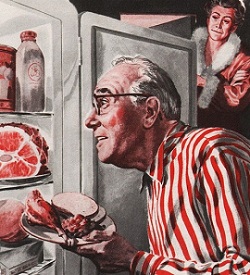- Home
- Better Memory
- Diet and Memory
- Late Eating Hurts Memory
Late-Night Eating Hurts Learning & Memory
If you want a stronger memory, avoid eating late at night. According to research, the proverbial "midnight snack" or even late dinners can weaken your memory and impair your ability to learn new things.
"We have provided the first evidence that taking regular meals at the wrong time of day has far-reaching effects for learning and memory," says Dr. Dawn Loh from the UCLA Laboratory of Circadian and Sleep Medicine.
Eating shortly before bedtime or in the middle of the night is already known to be generally unhealthy. Late eating disrupts sleep patterns, encourages weight gain and diabetes, and increases the risk of acid reflux.
Acid reflux itself may manifest unpleasant symptoms. These include heartburn, indigestion, postnasal drip, coughing, asthma, chronic throat clearing, and difficulty swallowing.
"To stop the remarkable increase in reflux disease, we have to stop eating by 8 p.m., or whatever time falls at least three hours before bed," according to Jamie Koufman, a physician who treats acid reflux.
If you've fallen into the habit of eating late or even in the middle of the night, and want to stop, try this simple trick that worked for me personally.
Late Eating Disrupts Memory Consolidation
 Late Meals Hurt Learning & Memory
Late Meals Hurt Learning & Memory
Weight gain, restless sleep, and reflux disease are bad enough. But now we're finding out that the memory centers of the brain, especially the hippocampus, are negatively affected by late night eating as well.
Scientists recently put this idea to the test. Researchers at the UCLA Laboratory of Circadian and Sleep Medicine recently published a study on this titled, Misaligned Feeding Impairs Memories.
During the study, the researchers found that mice who had their meals during the hours when they normally slept had significant problems with their memory. Mice who ate during their waking hours had no such memory problems.
"Those animals that were misaligned show severe deficits in their recall of the training that they received," according to Christopher Colwell, one of the experts in the study.
Consolidation of memories, the process where new learning is solidified into permanent long-term memory, is thought to occur during sleep cycles. When that process is interrupted by a period of awakening and eating, long-term memories may not form completely.
"We showed that under these eating conditions, some parts of the body, especially the hippocampus, are completely shifted in their molecular clock," says Colwell. "So the hippocampus, the part of the brain which is so essential for learning and memory, is actually following when the food is available."
When you eat at night, the nightly consolidation of memories, of which the hippocampus plays a critical part, is short-circuited. The input of food at the wrong time distracts the hippocampus from it's job of forming new, permanent memories.
 Save Treats & Meals for Daytime
Save Treats & Meals for Daytime
"By consuming food at the 'wrong' time of day, we induce misalignment between the various clocks in the brain and body," Loh said.
"We demonstrate for the first time that this food-induced misalignment leads to profound impairment of hippocampal-dependent memory as well."
Eating a late night snack or meal once in a while probably won't hurt. But if you are eating dinner at 11 pm every night or waking up for a bowl of ice cream consistently at 2 am, you could pay a heavy price with poorer memory and increased risk of serious disease.
Experts recommend eating no later than about 3 hours before bedtime. This provides enough time for your food to digest before going to sleep.
If you've fallen into the habit of eating a very late dinner or getting up for a snack in the middle of the night, try to make changes to your schedule to avoid this. You might be rewarded by a boost to your health and your brain power.
Published: 03/05/2016
Last Updated: 03/26/2020
[+] References for Don't Eat Late at Night
Published: 03/05/2016
Last Updated: 06/11/2020
- Home >
- Better Memory >
- Diet & Memory >
- Late Eating Hurts Memory

Newest / Popular
Multiplayer
Board Games
Card & Tile
Concentration
Math / Memory
Puzzles A-M
Puzzles N-Z
Time Mgmt
Word Games
- Retro Flash -
Also:
Bubble Pop
• Solitaire
• Tetris
Checkers
• Mahjong Tiles
•Typing
No sign-up or log-in needed. Just go to a game page and start playing! ![]()
Free Printable Puzzles:
Sudoku • Crosswords • Word Search

Hippocampus? Encoding? Spaced repetition?
Look up memory or brain terms in the A-Z glossary of definitions.






